
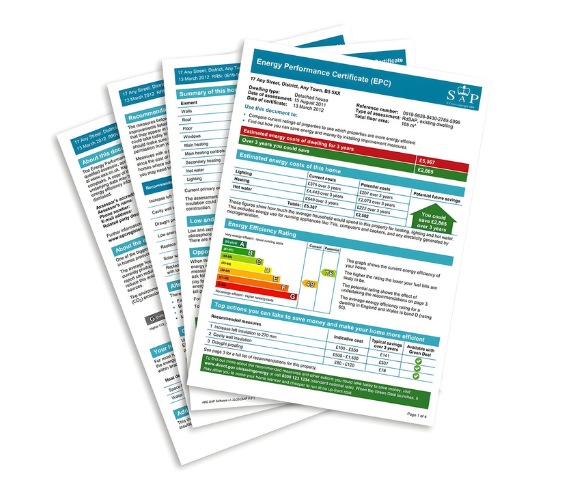
If you're a property owner, landlord, tenant, or even a prospective buyer or investor in commercial buildings, it's crucial that you understand what a Commercial EPC is and why it is necessary.
EPC Crew will provide you with all the essential information you need, covering topics such as the definition of a Commercial EPC, its benefits, the types of buildings that require one, penalties for non-compliance, the assessment process, duration, cost, and what's included in the survey and inspection.
We offer a no-nonsense EPC assessment service to get your property inspected and provide you with a valid certificate as soon as possible.
A Commercial Energy Performance Certificate (EPC) is a legal document that assesses and rates the efficiency of commercial premises (also called non-residential buildings) in the United Kingdom in relation to energy use and consumption. This rating is based on a scale from A to G, with A representing the most energy-efficient properties and G the least. The purpose of the EPC is to provide information to building owners, tenants, and prospective buyers regarding the energy performance of a building.
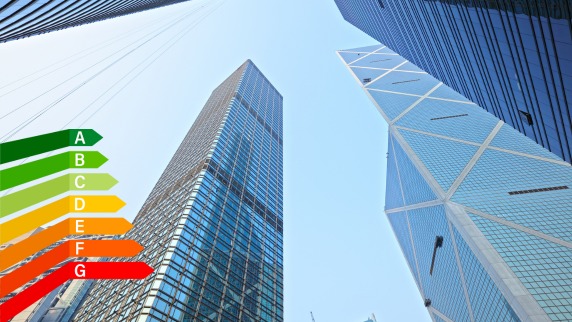
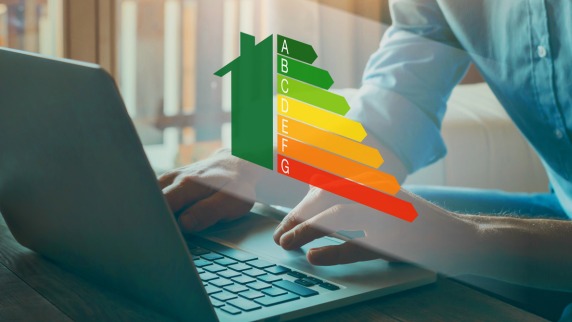
EPC ratings are determined through an evaluation of various factors, including the building's insulation, heating, ventilation, lighting systems, and overall energy usage. Energy Assessors use these factors to calculate the efficiency of the property and assign it a rating. We covered this in detail over on our blog in an article entitled “how are energy performance certificates calculated”.
Once the assessment is complete, a detailed report is generated, and an EPC certificate is issued. This certificate includes the EPC rating, recommendation report, and other relevant information about the property. It's important to note that an EPC is valid for ten years, after which it needs to be renewed.
Our goal is to consistently deliver exceptional service to all of our customers, regardless of property size. We hold ourselves to the same high standards for every client who relies on us for their EPC needs.








One of the primary benefits of obtaining a Commercial EPC is compliance with UK law. It is a mandatory requirement for most commercial properties to have a valid EPC. Failing to obtain or display an EPC can result in penalties, including a fine of up to £5,000.
By assessing your building, you gain insights into areas where improvements can be made. Implementing these improvements can lead to cost savings on energy bills, reduced carbon emissions, and a more sustainable business operation.
A high EPC rating can enhance the rateable value or market value of your commercial property. Prospective buyers and tenants are more likely to be attracted to energy-efficient buildings, making your property a more attractive investment.
Improving your building's efficiency contributes to your corporate social responsibility. It demonstrates a commitment to reducing carbon emissions and minimising your environmental footprint.
Having a high EPC rating can be used as a marketing tool. You can showcase your property's green credentials, which can attract environmentally-conscious tenants or buyers.


Commercial EPCs are required for a wide range of non-domestic properties, including but not limited to:
It is essential to have a valid EPC when renting, selling, or constructing any of these property types.
It's important to note that EPCs are also required for new buildings. When a new commercial building is constructed, an EPC is needed to demonstrate that it is efficient. This helps in promoting sustainable construction practices.
Existing commercial buildings, when sold or rented, also require an EPC. This ensures that older properties meet certain standards, even if they were built before such regulations came into effect.
Some buildings don't require an EPC but must display a DEC, and EPC Crew can help with this as well.
A DEC, or Display Energy Certificate, is a document that provides information about the energy usage and efficiency of a building. It is primarily used in the United Kingdom and the European Union to display and communicate a building's energy performance to the public. DEC is part of the broader effort to promote sustainability and reduce carbon emissions in buildings. We covered this in detail over in our blog in an article entitled “what is a display energy certificate”.
Here are the key points about Display Energy Certificates:
Now, let's compare DEC with EPC (Energy Performance Certificate):
In summary, DEC and EPC serve different purposes in the context of efficiency and building performance:


Failing to obtain and display a valid Commercial EPC can result in penalties. These may include fines of up to £5,000, and in the case of non-compliance, while selling or renting a property, it can render any transaction legally invalid.
Local Trading Standards offices are responsible for enforcing the display of EPCs. Property owners must ensure that a valid EPC is available to prospective buyers or tenants when a property is marketed.
Commercial EPC assessments must be conducted by qualified and accredited Energy Assessors. These assessors have the knowledge and expertise to evaluate a building's energy performance, produce the EPC, and provide recommendations for improvements.
All EPC Crew assessors are qualified for the task and will operate with efficiency and integrity.
Energy Assessors must be a part of accreditation schemes recognised by the government. These schemes ensure that assessors have the necessary training and skills to carry out accurate assessments.
Energy Assessors must also operate independently and not be influenced by the property owner's preferences or potential financial interests in the assessment results. Any attempts to influence the decision will be regarded as fraud and reported to the appropriate authorities.
Once an assessment is complete, the Energy Assessor issues a certificate, which includes the appropriate rating and recommendations for improvement. This certificate is made available to both the property owner and any prospective buyers or tenants.
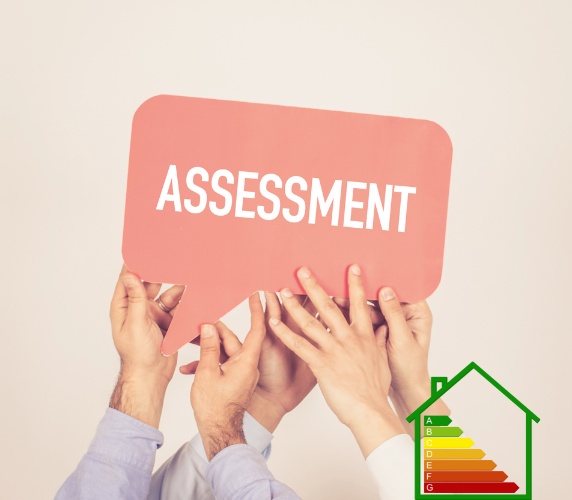

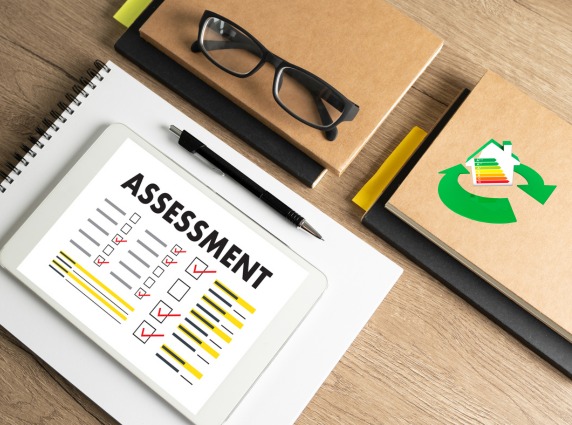
The duration of a Commercial EPC assessment varies depending on the size and complexity of the building. On average, the assessment can take a few hours. It involves a site visit by the Energy Assessor and the collection of data about the building's structure, heating, ventilation, and lighting systems.
The complexity of the building's energy systems can affect the assessment duration. Large, multifunctional buildings with intricate heating, ventilation, and cooling systems may require more time for a thorough evaluation.
Data collection plays a crucial role in the assessment process. The Assessor collects data on insulation, lighting, air conditioning, and heating systems to calculate the efficiency rating.
The Energy Assessor conducts a physical site visit to examine various aspects of the building, including its structure, insulation, and systems. This on-site assessment helps in making accurate determinations.
The cost of Commercial Energy Performance Certificates can also vary. It depends on factors like the property's size and location, the complexity of the systems, and the accredited assessor's fees. Generally, you can expect to pay a few hundred pounds for a standard assessment.
Several factors influence the cost of a Commercial EPC:


During the EPC assessment, the Energy Assessor will evaluate various aspects of the building, including:
The data collected during the assessment is used to generate the EPC and recommendations for necessary improvements. We have covered in detail on our blog “how to improve your energy performance certificate rating”.
While most non-residential properties require Energy Performance Certificates, some exemptions exist. These include:
It's essential to consult with a qualified Energy Assessor to determine if your property falls under any of these exemptions.
Listed buildings, those considered of historical or architectural significance, may be officially protected and exempt from certain minimum energy performance requirements. Much depends on whether the recommended alterations and improvements would unacceptably alter the nature of the building, particularly relating to the frontage.
However, this exemption is not absolute, and it's important to consult with the local authority and assessors to understand the specific regulations that apply.


The regulations are changed and updated frequently, so it's vital to keep on top of things. At EPC Crew, we have our finger on the pulse and will keep you informed.
For example, since 1 April 2018, it has been a legal requirement to have a rating of E or above for any new leases, and this was due to change on 1 April 2023, at which point the rules would become more stringent and would be applied retrospectively to all commercial property leases.
However, this proposal was suddenly reversed a few weeks after being announced.
As it stands, all landlords must secure at least an E rating before leasing any commercial property. The penalty for infringement starts at £5,000.
This is a critical aspect of maintaining a sustainable and cost-effective commercial property. Understanding the importance of energy use and efficiency can help you make informed decisions regarding building improvements and long-term operational cost reductions.
One of the most significant advantages of carefully managed energy use in commercial buildings is cost savings. By reducing energy consumption, you can significantly lower utility bills. For many businesses, energy costs are a substantial portion of their operating expenses. Improving the efficiency of energy use translates into real savings that can be reinvested in the business.
Energy-efficient buildings are environmentally responsible. They reduce the carbon footprint and contribute to global efforts to combat climate change. Being a sustainable and responsible business is not only good for the environment but can also be a selling point for attracting environmentally-conscious customers and clients.
Highly efficient buildings are more attractive to tenants. Occupants often prefer spaces with lower operating costs, improved comfort, and reduced environmental impact. Energy efficiency improvements can also play a role in tenant retention, as satisfied occupants are more likely to renew leases.
Regulations in this area are becoming increasingly stringent. Compliance with EPC regulations ensures you meet legal requirements and avoid potential penalties.
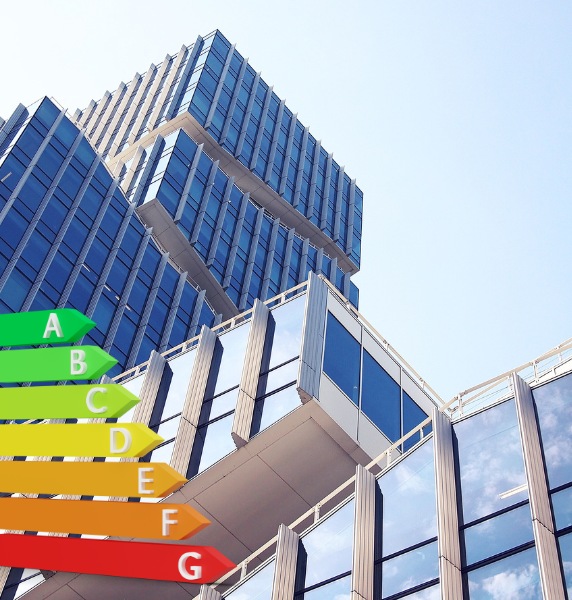


There are several strategies to improve your commercial property's EPC rating:
Ongoing Maintenance. Regular maintenance of your building's systems is essential for improving sustainability. Ensuring that all systems operate optimally and addressing any issues promptly can help maintain a high EPC rating.
The field of energy performance certificates is subject to evolving regulations. It's essential to stay informed about recent changes that may impact your commercial property. Recent updates may involve adjustments to assessment methodologies, new energy performance standards, or additional compliance requirements.
The government periodically reviews and updates energy efficiency regulations for commercial properties. These changes aim to improve current standards and reduce carbon emissions. Staying informed about upcoming changes will help you prepare for compliance. If you have any concerns about this, please get in touch with EPC Crew.
New regulations often have implications for existing commercial properties. Property owners may need to make adjustments to meet updated requirements and maintain their EPC ratings.
Regulatory changes can also offer benefits, such as access to incentives for energy system upgrades or improved building performance through modern systems and technologies.
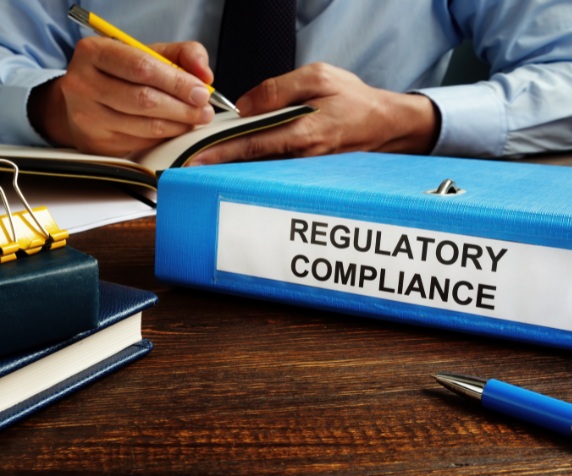

Let's examine some real-world case studies where businesses and property owners have experienced tangible benefits from obtaining and improving their Commercial EPC ratings.
A retail store in the heart of a bustling city decided to invest in more eco-friendly lighting, heating, and cooling systems to improve its EPC rating. The result was a significant reduction in monthly utility costs and a noticeable increase in foot traffic, as customers were attracted to the store's commitment to sustainability.
An office building updated its insulation and windows, ensuring better thermal efficiency. This not only lowered heating and cooling expenses but also made the office space more comfortable for employees. As a result, tenant satisfaction increased, and the property owner was able to command higher rental rates.
A well-known hotel chain decided to adopt a comprehensive energy management plan, which included EPC improvements. By switching to more efficient appliances, and lighting, and implementing effective waste management, the chain significantly reduced its operational costs. This strategic move also contributed to the brand's image as an eco-friendly choice for travellers.
A manufacturing facility invested in better equipment and lighting to improve its EPC rating. This led to reduced energy consumption, lower operational costs, and an improved environmental footprint. The facility's commitment to improvements also helped it secure contracts with environmentally-conscious clients.
A Commercial EPC is a vital document for any owner, tenant, or investor in non-residential buildings in the UK. It not only ensures legal compliance but also offers numerous benefits, including energy savings and increased property value. Understanding the types of buildings that require EPCs, the potential penalties for non-compliance, the process involved, and the significance of energy efficiency can help you make informed decisions regarding your commercial property. If you have any further questions or require a Commercial EPC assessment, don't hesitate to contact EPC Crew, your trusted partner in energy efficiency.

Submit your review | |


Yes, you need an Energy Performance Certificate (EPC) for commercial property in the UK if you rent out or sell the premises, if a building under construction is finished, or if there are changes to the number of parts used for separate occupation and these changes involve providing or extending fixed heating, air conditioning, or mechanical ventilation systems.
The owner or landlord of the commercial property is responsible for obtaining an EPC. If you don't make an EPC available to any prospective buyer or tenant, you can be fined between £500 and £5,000 based on the rateable value of the building.
The main difference between commercial and residential EPCs is their application. A commercial EPC is used for business premises, while a residential EPC is used for dwellings. Both certificates rate the energy efficiency of a building, but they are used for different types of properties.
A commercial EPC is valid for 10 years. After this period, you will need to obtain a new certificate if you intend to sell or rent out the property.
